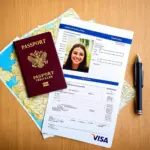Picture this: you’re finally on that dream vacation to Thailand, exploring bustling markets and indulging in delicious street food. But then, disaster strikes – traveler’s diarrhea hits, leaving you feeling miserable and stuck in your hotel room. As you worry about the days ahead, a new fear creeps in – is this contagious? Can you pass this on to your travel companions or, worse, the friendly locals you’ve encountered?
Understanding Traveler’s Diarrhea
Traveler’s diarrhea, often called “TD,” is a common woe for globetrotters. It’s characterized by loose, watery stools, often accompanied by cramps, bloating, and nausea. The culprit? Usually, bacteria, viruses, or parasites lurking in contaminated food or water. Think of that tempting salad washed with local water or that ice cube in your exotic cocktail.
So, is it contagious?
Here’s the good news – traveler’s diarrhea itself is usually not directly contagious. You won’t pass it on like a common cold. However, there’s a catch.
The Catch: Sharing is NOT Caring
While you won’t directly transmit traveler’s diarrhea, the bacteria, viruses, or parasites that caused it can still spread. How? Through poor hygiene practices. Imagine this scenario – you’re sharing a plate of delicious Pad Thai with your partner, but you forget to wash your hands thoroughly after a bathroom break. If you’ve picked up a nasty bug, you could unknowingly pass it on.
Prevention is Key
The key takeaway here is simple: good hygiene is your best defense. Remember these tips:
- Wash your hands frequently: Especially before eating, after using the bathroom, and after touching money or surfaces in public places.
- Carry hand sanitizer: When soap and water aren’t available, alcohol-based hand sanitizer is your best friend.
- Drink bottled water: Avoid tap water and ice in regions where water quality is questionable.
- Be cautious with food: Stick to well-cooked food from reputable sources. Be wary of raw fruits and vegetables unless you can peel them yourself.
- Consider probiotics: Some studies suggest that probiotics might help prevent traveler’s diarrhea. Consult your doctor for recommendations.
What if you still get sick?
Despite your best efforts, sometimes traveler’s diarrhea sneaks up on you. If it does:
- Stay hydrated: Diarrhea can lead to dehydration, so drink plenty of fluids like bottled water, oral rehydration solutions, or clear broth.
- Get some rest: Your body needs time to recover, so prioritize rest.
- Consider over-the-counter medications: Medications like loperamide (Imodium) can help slow down diarrhea, while bismuth subsalicylate (Pepto-Bismol) can ease symptoms.
- Seek medical attention if needed: If your symptoms are severe, persistent, or accompanied by fever, blood in your stool, or signs of dehydration, see a doctor immediately.
Travel Smart, Stay Healthy
Remember, traveler’s diarrhea, while unpleasant, is usually preventable. By practicing good hygiene, making smart food and water choices, and knowing what to do if you get sick, you can enjoy your adventures without letting an upset stomach slow you down.
For more tips on staying healthy while traveling, visit our website TRAVELCAR.edu.vn. We offer a wealth of information on travel health, including articles like “How do you get traveler’s diarrhea?” and “What shots do I need to travel to Africa?”
